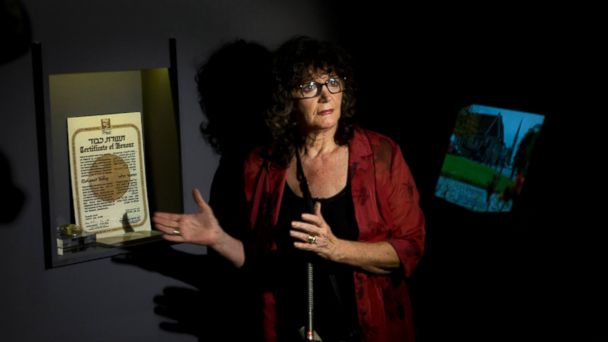Family of Arab Holocaust Hero Rejects Award From Israel

Irena Steinfeldt, an official at Israel's Yad Vashem Holocaust memorial, shows a certificate recognizing Mohamed Helmy, an Egyptian physician in Berlin, as "Righteous Among the Nations" for saving a Jewish family during the Holocaust, in Jerusalem, Sept. 30, 2013. (Image Credit: Sebastian Scheiner/AP Photo)
The family of an Arab doctor who risked his life during the Holocaust to help his Jewish friends has reportedly rejected Israel's "Righteous Among the Nations" award.
Dr. Mohamed Helmy, who died in 1982, was recognized last month with the Israel's highest award given to non-Jews for his work in shielding friends in Berlin during the Nazi regime.
Yad Vashem, the Holocaust Martyrs' and Heroes' Remembrance Authority, said it was searching for Helmy's next of kin so they could be presented them with a medal and certificate of gratitude for his work.
The Associated Press tracked down Mervat Hassan, the wife of Helmy's great-nephew, in Cairo this week and learned the family wasn't planning on accepting the prestigious award due to tense relations between Egypt and Israel.
"If any other country offered to honor Helmy, we would have been happy with it," Hassam told the AP.
Helmy settled in Berlin in 1922, where he studied medicine and then worked as a doctor until he was forbidden to work in the public health system due to his non-Aryan lineage.
When deportations of Jews began from Berlin, Helmy hid 21-year-old Anna Boros, a family friend, in a cabin he owned.
"The Gestapo knew that Dr. Helmy was our family physician, and they knew that he owned a cabin in Berlin-Buch," Boros wrote after the war, according to Yad Vashem.
When Helmy felt at risk of being interrogated, Boros said the doctor would bring her to stay with friends, introducing her as his cousin from Dresden.
"When the danger would pass, I would return to his cabin," she wrote. "Dr. Helmy did everything for me out of the generosity of his heart and I will be grateful to him for eternity."
According to Yad Vashem, Helmy also helped Boros' family during the war by arranging hiding places for them, bringing them food and attending to their medical needs.
A spokesperson for the memorial told the AP in a statement, "We regret that political sentiment seems to have overcome the human aspect and hope one day that the latter will prevail."